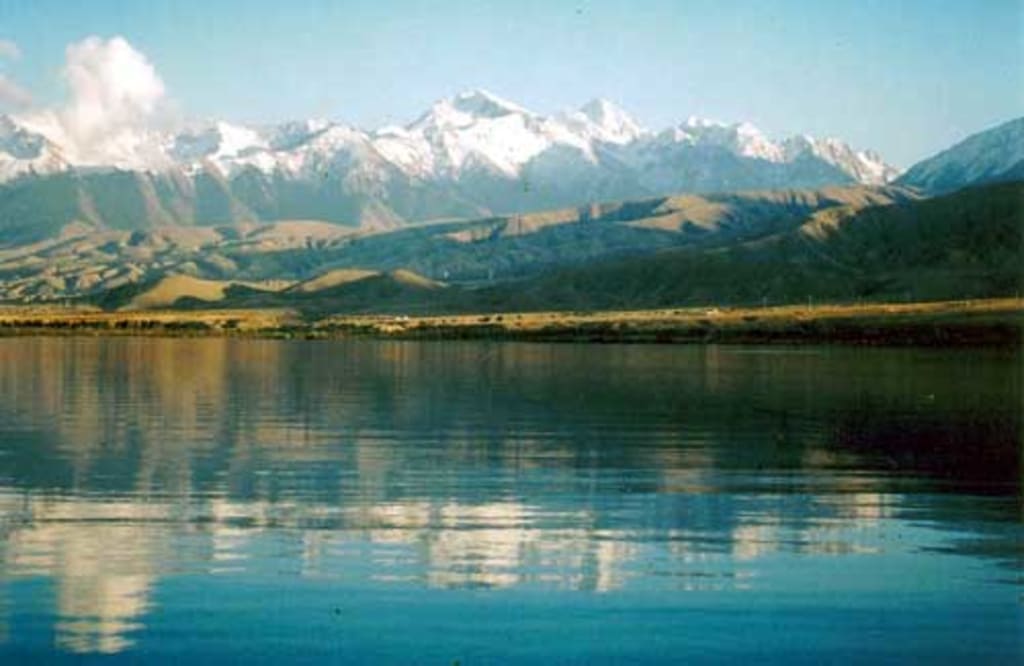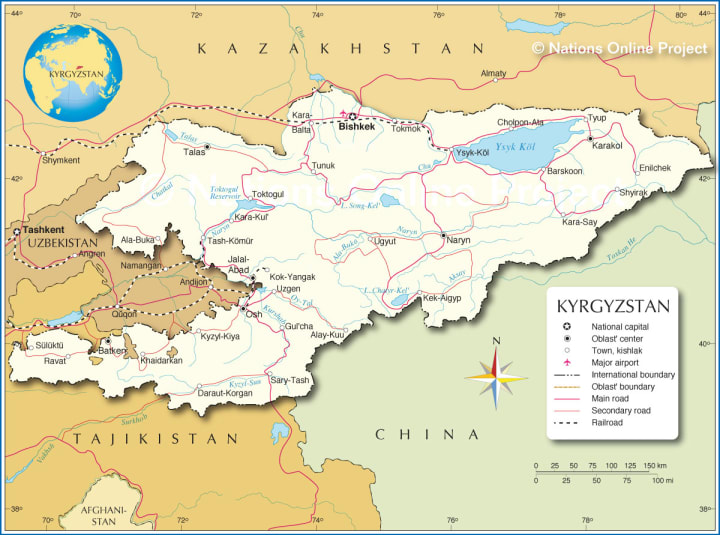Origin Myth of the Issyk-Kul Lake
My second Vocal MythMaker Challenge Entry

Let me present to you another Turkic myth of creation, this time about the Issyk-Kul lake. Located in Kyrgyzstan, this nature's pearl is the second deepest lake in the world, after Baikal in Russia. In Kyrgyz, "issyk" means "warm, hot" and "kul" - "lake." Some people say it is called a "warm lake" because it never freezes in the winter, even though the winters in the mountains surrounding it on all sides can be quite cold. Others say that it is called "warm lake" because it was formed from the tears of people who were wronged one way or another and cried so much that they flooded the mountain-nestled valley with the lake. There are numerous myths and legends about the lake formation, and below is the tale I weaved from several of my favorites. Please note that the Turkic cultures, especially those associated with Tengrism (worshiping the divine sky), revered the Sun and the Moon deities as a part of their worldview.

A loooooong, long time ago, in a beautiful valley nestled in high mountains, there lived a very greedy and cruel khan (king) named Iskender. He was rich beyond imagination and demanded perfection and luxury in everything. So his people built him the most beautiful shiny city of gold, risen on the blood and tears of many of the khan's slaves and wards. Iskender had the best horses and camels bred for him, and sitting on the Great Silk Road he had no limit to grow his riches through trade.
Iskender had more than 40 wives who gave him many children, but in his eyes they were never strong and brave enough for a boy or beautiful enough for a girl. So the khan gave his servants an order to find him the most beautiful young woman, with the face of the full round moon, long black braided hair, and the passion and determination of a hot sun. He dispatched the servants to all corners of the country to find such a woman and all of them came back, one by one, with nothing. There was no woman who would match Iskender's high beauty and stamina standards.
Some moon years before that, in a small village hidden in high mountains not too far from Iskender's city, a beautiful young woman was growing up, without knowing who she truly was. Her father and two older brothers, hunters and shepherds of mountain yaks, had left her mother at the village and went into the mountains to hunt and tend to their yaks without knowing that the wife had become pregnant. She gave birth to a beautiful healthy baby girl before they returned for the winter season and died shortly after. A wealthy childless woman from a nearby village was passing by, found the newborn girl alone and crying of hunger and cold and took her to raise as her own daughter. She named her Aysulu, which means "moonlight," for the beauty and ethereal glow of the moon goddess. The girl grew up into a beautiful young woman with rich black hair so long that she needed help of a dozen maidens to wash and braid it.

One day, when Aysulu was washing her hair in the mountain river with the help of her maidens, one of the hairs got torn out and floated down the river. Aysulu was so upset about losing the hair that she started to cry, adding her tears to the river's waters. The maidens tried to run for the hair to catch it but the treacherous sharp rocks of the river bed cut their feet and the hair floated away.
Meanwhile, one of the khan's servants nick-named Tabuuchu (meaning "the finder") who had been sent scouting for the new bride because he could find anything was returning to the city with no result. He needed to take a break for his horse to drink from a mountain river. As he led the horse to the river, Tabuuchu saw the black hair floating by and caught it. It was so long and thick that when he wrapped it around his left index finger, the finger became two times thicker. Tabuuchu returned to the city and showed the hair to the khan.
"Find me that woman at once!" Iskender roared. "A woman with hair like this must be the most beautiful woman in the world! If she does not want to come and marry me on her own, tie her to my horse with her own braids and bring her to me!"
So several servants led by Tabuuchu were dispatched to bring the woman. It wasn't too hard: They just followed the river where the hair was found upstream. When they found the woman, her beauty nearly blinded them. Tabuuchu fell in love with her at first sight, but who was he to disobey the khan's orders? He told Aysulu that Iskender wanted to marry her and ordered to bring her to him even against her will. Iskender's fame was well-known everywhere in the country, so Aysulu said she did not want to marry the old, cruel and fat khan. Besides, she was also falling in love with Tabuuchu whom she found handsome and brave. But the other servants followed through Iskander's order. Fearing for their lives, they tied Aysulu with her own braids to the horse the khan meant as a gift for the bride, and brought her to the city.
Iskender was stricken by the girl's beauty so much that at first he wanted to win her love. He gave her the lavish gifts of clothes made of finest silk and thickest fur, jewelry crafted by the most skillful artisans of the city, and the best horses and camels he had. When Aysulu rejected all his gifts and repeatedly told him she would never marry him, Iskender imprisoned her in the tallest tower of his city.
"You will stay there until you change your mind and agree to marry me!" Iskender raged at her.
"I would rather jump off that tower!" the girl responded.
"We'll see!" Iskender said, mumbling to himself, "she is indeed as hot-tempered as the Sun and beautiful as the Moon! This woman will be mine, one way or another!" He then ordered to install iron bars on all windows in the tower and keep the girl locked in there, guarded day and night.
Aysulu spend her days and nights in the tower, crying for her ruined young life and Tabuuchu. She prayed to the Moon goddess asking for help to escape and run away with him. One night, Tabuuchu overheard her prayers. His heart nearly jumped out of his chest with joy when he realized Aysulu was in love with him. Inspired by her love, he decided to rescue the girl. But first, he needed to find her relatives where he could bring her to hide from the khan.
Tabuuchu went back to the village and found the woman who raised Aysulu. She told him how she had found her and Tabuuchu went to the other village and found the girl's father and brothers. After all, he was named Tabuuchu not for nothing. They were happy beyond words as they never knew the fate of their mother and wife. And here, they suddenly acquired a baby sister and daughter. Together, they plotted how to rescue the girl and bring her back to her village so that her father and brothers could take care of her until Tabuuchu came back to marry her.
When Tabuuchu returned to the city, he waited for one of his servant friends to be assigned to guard Aysulu, distracted him and let Aysulu out. He took her back to her father and brothers and promised her to return soon so that they could marry and run away together. Not to raise Iskender's suspicions, he returned to the city as if nothing happened.
When Iskender found out Aysulu was gone, he was enraged. He tortured Tabuuchu's guard friend who told him of the betrayal. Iskender ordered to lash Tabuuchu with the hooked whip until he confessed where Aysulu was. Tabuuchu never said a word but Iskender was not stupid himself. He tied Tabuuchu to his loyal horse and followed the horse who brought the nearly dead bleeding young man to Aysulu. The girl almost fainted when she saw her beloved, took him off the horse with the help of her brothers and started to tend for him. Jealous and enraged Iskender waited until the dead of the night, went into the girl's home, woke up Aysulu and killed Tabuuchu in front of her while he was in a delirious sleep of a wounded man. Iskender then kidnapped Aysulu, brought her back to the city and locked her up in the tower again.
Aysulu was so desolate and heartbroken that she decided to kill herself. There was no reason for her to live without Tabuuchu and she prayed to the Moon goddess to unite them in death. Using her strong thick hair, Aysulu managed to saw through one of the window's bars. She then threw herself off the tower and died.
When the Moon goddess saw this tragedy, she decided to punish Iskender. She sent an earthquake on the cruel khan's valley so powerful that it destroyed the entire city and flooded it with the mountain river that got swelled up with all the tears of people killed and tortured by the khan. Thus, the Issyk-Kul lake appeared in the valley. On one side of it, a powerful high mountain rose with a shape of a bleeding heart on it, to symbolize Aysulu and Tabuuchu's eternal love. To this day, people see the glimpses of a beautiful ancient city reflected from the lake's deep bottom on its surface, but only on a perfectly clear and calm day.
Thank you for reading! My other MythMaker story based on a Turkic myth is below:
About the Creator
Lana V Lynx
Avid reader and occasional writer of satire and short fiction. For my own sanity and security, I write under a pen name. My books: Moscow Calling - 2017 and President & Psychiatrist






Comments (3)
This is the first Turkic myth I've ever read. What a tragic end. That king was such a psycho. Very entertaining read! Well done!
Thoroughly enjoyed this article. The mix of history and terminology is what I liked the most.
Fully enjoyed the writing… great way of learning other cultures. Thank you Lana!